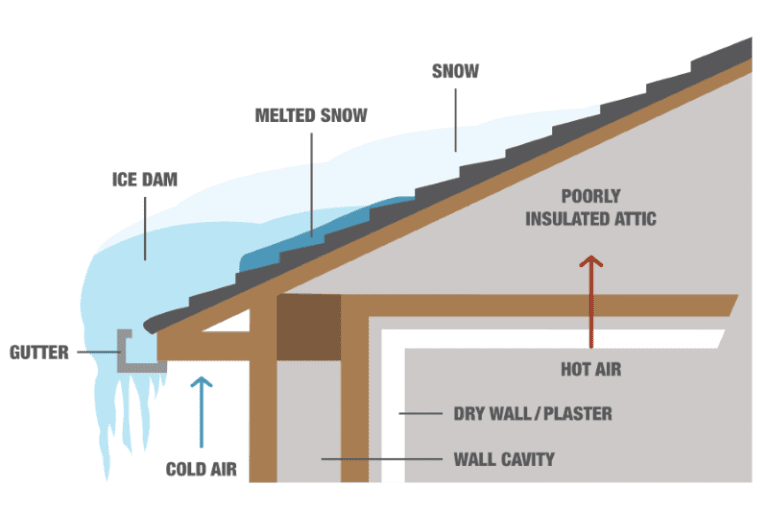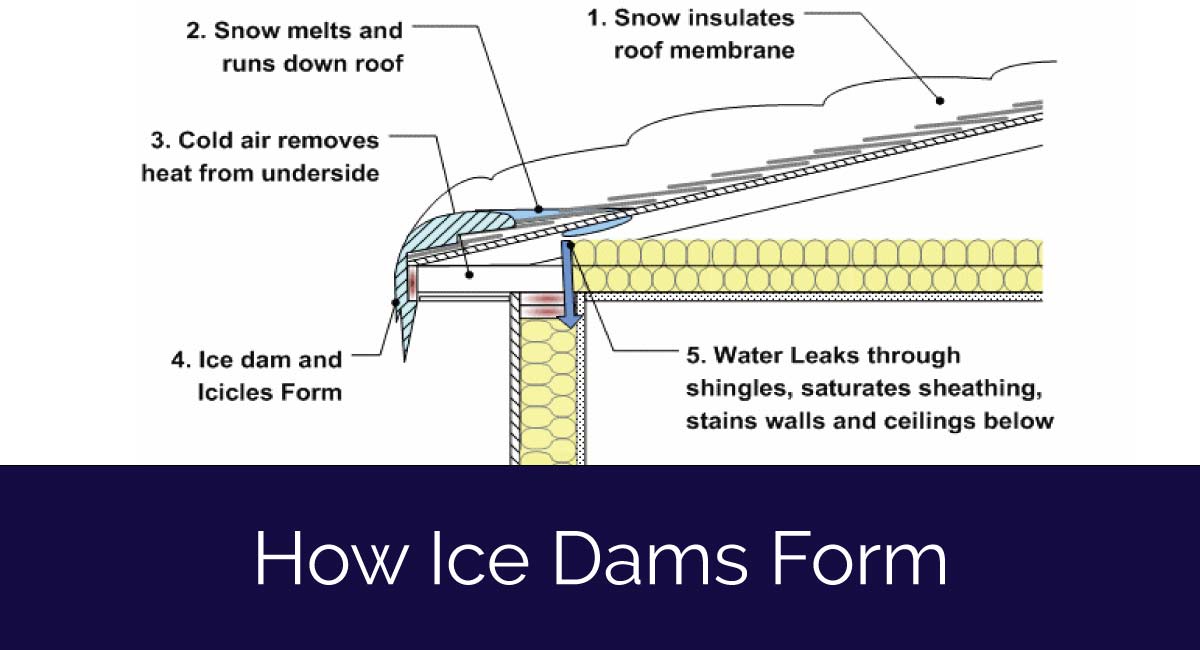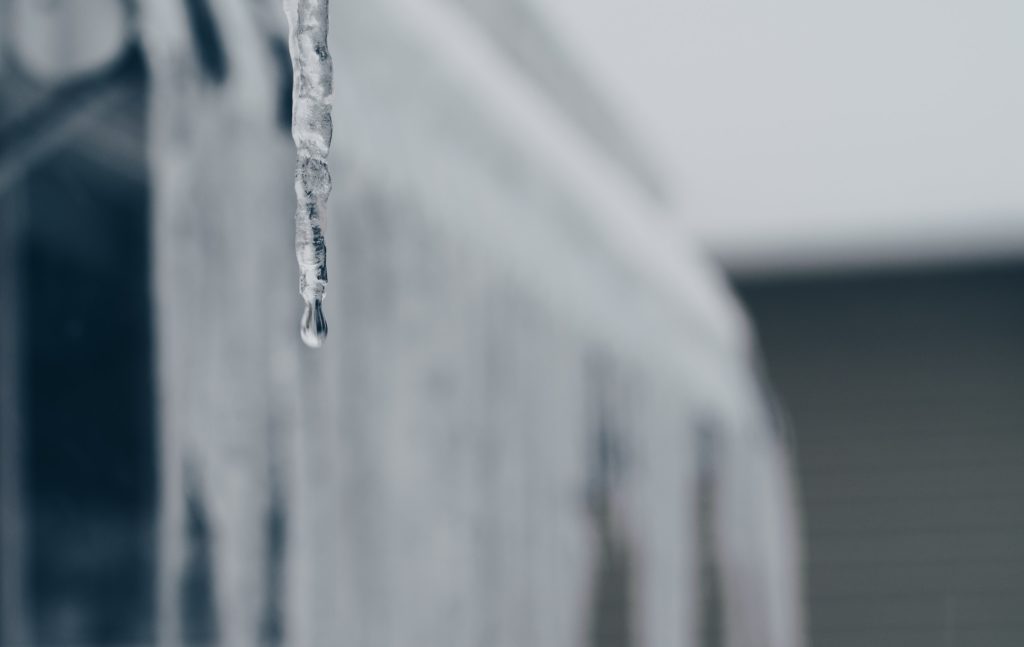How Do Ice Dams Form
How Do Ice Dams Form - Web ice dams are those thick ridges of ice that form and build up along the eaves of your home. There are four things you should do before winter arrives: Ice dams are caused by variations in the temperature of your roof. The meltwater flows to the cold eave overhang where it refreezes. Wasatch heat cable 1.22k subscribers 835 views 4 years ago ice dams can be extremely damaging to your home. Fast fixes while a permanent fix. Web the best way to deal with ice dams is to prevent them from forming in the first place. They can be a health hazard in some rare instances, but more importantly, they prevent ice. Web how does an ice dam form? Web ice dams form when heat loss through the roof melts snow on the roof.
They can be a health hazard in some rare instances, but more importantly, they prevent ice. The eave is the edge of the roof that overhangs atop the. Ice dams are a large mass of ice that form on your home’s gutters and eaves. Web understanding the lifecycle of an ice dam birth. First, heat collects in the attic. Fast fixes while a permanent fix. Web ice accumulates along the eaves, forming a dam. Here’s a breakdown of the conditions that lead to the formation of ice dams: Web ice dams form when heat loss through the roof melts snow on the roof. Ice dams are caused by variations in the temperature of your roof.
They can be a health hazard in some rare instances, but more importantly, they prevent ice. Web understanding how are ice dams are formed around your home when it comes to ice dams around your home it is important to understand how they are formed. When the snow melts up top, it slides down towards the bottom. Ice dams are caused by variations in the temperature of your roof. For starters, there must be snow on your roof and the exterior temperature needs to be below 32. Here’s a breakdown of the conditions that lead to the formation of ice dams: Web ice dams form when heat loss through the roof melts snow on the roof. Meltwater from the warm roof backs up behind it, flows under the shingles, and into the house. The meltwater flows to the cold eave overhang where it refreezes. Web how do ice dams form?
Battic Door Energy Conservation Offers Tips on How To Prevent Ice Dams
Web how do ice dams form? Web how does an ice dam form? Ice dams are caused by variations in the temperature of your roof. Meltwater from the warm roof backs up behind it, flows under the shingles, and into the house. Web the best way to deal with ice dams is to prevent them from forming in the first.
how to get rid of ice dams AM Insulation Solutions
Web understanding the lifecycle of an ice dam birth. The eave is the edge of the roof that overhangs atop the. When the snow melts up top, it slides down towards the bottom. There are four things you should do before winter arrives: Ice dams are caused by variations in the temperature of your roof.
Ice Dams 101 How to Identify, Prevent & Remove Ice Dams
They can melt some and then refreeze, causing a substantial chunk of ice to lay. Web ice accumulates along the eaves, forming a dam. Fast fixes while a permanent fix. Web how do ice dams form? Ice dams occur after a heavy snowfall when the warm air in your home rises to the ceiling, into the attic, and causes the.
Common Causes of Ice Dams
Web ice dams form when heat inside your home enters the attic and melts the snow. Wasatch heat cable 1.22k subscribers 835 views 4 years ago ice dams can be extremely damaging to your home. The eave is the edge of the roof that overhangs atop the. Web ice dams form when a roof's surface is unevenly heated. Web understanding.
What is an Ice Dam? 1 Roof Replacement and Repair Company
For starters, there must be snow on your roof and the exterior temperature needs to be below 32. Ice dams are a large mass of ice that form on your home’s gutters and eaves. Web for an ice dam to form, there are certain conditions that need to be in place. They can melt some and then refreeze, causing a.
Understanding How Are Ice Dams Are Formed Around Your Home
Web how do ice dams form? The meltwater flows to the cold eave overhang where it refreezes. There are four things you should do before winter arrives: Web ice accumulates along the eaves, forming a dam. Ice dams are caused by variations in the temperature of your roof.
What You Need to Know About Ice Dams & Roof Repair Walter St Clair
They can be a health hazard in some rare instances, but more importantly, they prevent ice. Ice dams are a large mass of ice that form on your home’s gutters and eaves. Web the best way to deal with ice dams is to prevent them from forming in the first place. Web understanding how are ice dams are formed around.
Easy Ice Dam Fixes for Your Roof Wind River Realty
Web understanding how are ice dams are formed around your home when it comes to ice dams around your home it is important to understand how they are formed. They can melt some and then refreeze, causing a substantial chunk of ice to lay. Web the best way to deal with ice dams is to prevent them from forming in.
How Do Ice Dams Form Frey Construction
Ice dams are caused by variations in the temperature of your roof. Web ice accumulates along the eaves, forming a dam. Web understanding how are ice dams are formed around your home when it comes to ice dams around your home it is important to understand how they are formed. Ice dams are a large mass of ice that form.
Why Do Icicles & Ice Dams Form on My Roof & What to Do About Them?
They can melt some and then refreeze, causing a substantial chunk of ice to lay. Web understanding how are ice dams are formed around your home when it comes to ice dams around your home it is important to understand how they are formed. Web how does an ice dam form? Web how do ice dams form? First, heat collects.
Web Ice Dams Form When Heat Loss Through The Roof Melts Snow On The Roof.
Web how does an ice dam form? Web how do ice dams form? When the snow melts up top, it slides down towards the bottom. Web the best way to deal with ice dams is to prevent them from forming in the first place.
Web Ice Dams Form When Heat Inside Your Home Enters The Attic And Melts The Snow.
Meltwater from the warm roof backs up behind it, flows under the shingles, and into the house. Web understanding how are ice dams are formed around your home when it comes to ice dams around your home it is important to understand how they are formed. First, heat collects in the attic. Watch this video to learn how they.
The Meltwater Flows To The Cold Eave Overhang Where It Refreezes.
When conditions are right to create an ice dam, the upper part of the roof is warmed from the attic below,. Ice dams occur after a heavy snowfall when the warm air in your home rises to the ceiling, into the attic, and causes the top of the roof to warm and the. They can melt some and then refreeze, causing a substantial chunk of ice to lay. Web how do ice dams form?
Here’s A Breakdown Of The Conditions That Lead To The Formation Of Ice Dams:
Web how do ice dams form? Web for an ice dam to form, there are certain conditions that need to be in place. Ice dams are caused by variations in the temperature of your roof. The eave is the edge of the roof that overhangs atop the.









